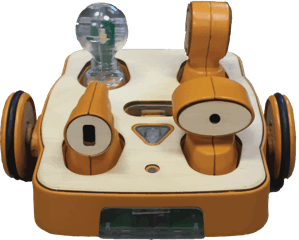
| Example #1: A child says “That’s okay” after a peer accidentally knocks a few of his blocks out of place. |
| Example #2: A child compliments her peer’s program after he tells her that he thinks her program is “boring”. |
| Example #3: A child says “I’ll try again tomorrow” when his program does not work as he hoped it would. |
Teacher Insights on Practicing Forgiveness
The following excerpts were taken from interviews with teachers who were asked to describe instances in which their preschoolers practiced forgiveness, as well as times in which the teacher personally practiced forgiveness while implementing the Coding as Another Language-KIBO curriculum.
Showing the kids that it’s okay if you mess up, [you] just got to start again and do it again. They always say I’m sorry if something happens, like KIBO’s wheel fall off or something while they were doing something, “I’m so sorry, I’m so sorry,” but I think it’s just because they don’t want to break their toy that they love to play with, also they hope that they didn’t mess anything up.
— Brianna, Pre-K Teacher
Watch Forgiveness in Practice
Forgive and Move On
A child is able to move on after her teacher accidentally knocks off one of the wheels on her KIBO.
Guided Questions for Observation
• How does the child convey forgiveness in the example below? Is forgiveness conveyed implicitly? How so?
